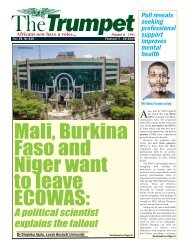The Trumpet Newspaper Issue 625 (June 12 - 25 2024)
Inside Egypt's secret scheme to detain and deport thousands of Sudanese refugees
Inside Egypt's secret scheme to detain and deport thousands of Sudanese refugees
Create successful ePaper yourself
Turn your PDF publications into a flip-book with our unique Google optimized e-Paper software.
News<br />
JUNE <strong>12</strong> - <strong>25</strong> <strong>2024</strong><br />
<strong>The</strong><strong>Trumpet</strong><br />
Inside Egypt's secret scheme<br />
to detain and deport thousands<br />
of Sudanese refugees<br />
Page3<br />
Continued from Page 2<<br />
police, military, and public prosecutor<br />
files on nearly 200 other refugees who<br />
were arrested and detained by<br />
authorities. One file described the arrest<br />
of 16 people, including a one-year-old<br />
child; another detailed the detention of<br />
14 people, including a girl aged 10.<br />
Most arrests targeted Sudanese citizens<br />
and Egyptian drivers, though one case<br />
involved six people from South Sudan.<br />
<strong>The</strong> majority of the cases<br />
investigated by reporters involved<br />
refugees detained in southern Egypt,<br />
either shortly after crossing the border<br />
or after arriving in the first main towns<br />
in the south. However, reporters also<br />
spoke to the relatives of several<br />
refugees who were arrested while<br />
conducting their daily business in the<br />
northern cities of Cairo and Alexandria<br />
and later deported, suggesting the<br />
crackdown is nationwide.<br />
“This feeling is looming over us,”<br />
said 34-year-old Ahmed, who entered<br />
Egypt irregularly in December and has<br />
been staying in Cairo for the past five<br />
months. “I rarely get out of the house. I<br />
only make short trips to get food and<br />
then return promptly.”<br />
Refugees said authorities carried out<br />
mass deportations, with buses taking<br />
hundreds of people to border crossings.<br />
Three said border guards or aid workers<br />
gave them bags of food, drinks, and<br />
hygiene supplies. <strong>The</strong> bags had printed<br />
logos of the World Food Programme<br />
and USAID, according to pictures<br />
shared with reporters. Refugees also<br />
said the towns they were deported to<br />
lacked accommodation and basic<br />
services.<br />
“When they told us that we would be<br />
deported to Sudan, the children cried<br />
because the soldiers lied to them and<br />
they were afraid of returning in light of<br />
the war,” said Nasifa, who was deported<br />
in late January. She described having an<br />
asthma attack while detained in a<br />
ramshackle military base and said<br />
soldiers did not bring her medicine.<br />
Arbitrary detentions and forced<br />
returns of migrants, refugees, and<br />
asylum seekers are common in Egypt,<br />
with previous campaigns by security<br />
forces also targeting citizens of Eritrea<br />
and South Sudan. Human rights groups<br />
say the crackdowns are hard to<br />
document because authorities do not<br />
publicly release detention and<br />
deportation data.<br />
<strong>The</strong> campaigns have been carried<br />
out while government and security<br />
forces have received support from<br />
European States. <strong>The</strong> support is<br />
motivated by Europe’s desire to stem<br />
migration from the country, which is a<br />
transit route for individuals wanting to<br />
cross the Mediterranean, and is also<br />
producing a growing number of its own<br />
migrants.<br />
Experts said State abuses against<br />
refugees and migrants are likely to<br />
increase as a result of the new $8 billion<br />
EU funding package, which includes<br />
more than $200 million for migration<br />
control. <strong>The</strong> deal is part of a broader EU<br />
approach of partnering with third<br />
countries – many with poor human<br />
rights records – to reduce migration.<br />
“<strong>The</strong>se agreements are unlikely to<br />
stem the flow [of migrants],” said<br />
Hossam el-Hamalawy, an Egyptian<br />
journalist and scholar who researches<br />
the country’s military and security<br />
services. “Instead, they may exacerbate<br />
casualties and further empower the<br />
already dominant military, which lies at<br />
the root of many issues in Egypt.”<br />
EU spokesperson Peter Stano said<br />
migration is just one of six pillars of<br />
intervention addressed by the new<br />
partnership with Egypt, and that<br />
“respect for human rights and<br />
international humanitarian law is a<br />
priority” for all EU-funded projects.<br />
“<strong>The</strong> EU expects Egypt, as other<br />
partners, to fulfill its international<br />
obligations including on the right to<br />
non-refoulement, and to uphold the<br />
human rights of all refugees and<br />
migrants,” Stanto said.<br />
Torture, car chases, and rapid<br />
returns<br />
<strong>The</strong> refugees detained in southern<br />
Egypt are handled differently depending<br />
on whether they are intercepted close to<br />
the border or arrested in towns and<br />
cities, according to witness testimonies,<br />
interviews with lawyers and<br />
government officials, and internal<br />
military, police, and public prosecutor<br />
documents.<br />
Refugees are especially vulnerable<br />
to abuse if they are intercepted near<br />
border areas, which are under military<br />
jurisdiction across Egypt. <strong>The</strong> areas are<br />
patrolled by border guard forces, which<br />
are a key part of the Egyptian military.<br />
Access, including for humanitarian and<br />
human rights groups, requires permits<br />
from military authorities.<br />
Several lawyers and border guard<br />
sources said Sudanese refugees<br />
detained in these areas are rapidly<br />
deported by border guard forces without<br />
being registered, and without any legal<br />
process. <strong>The</strong> sources said this is not in<br />
keeping with how border guards used to<br />
handle refugees and migrants<br />
Continued on Page 6
















